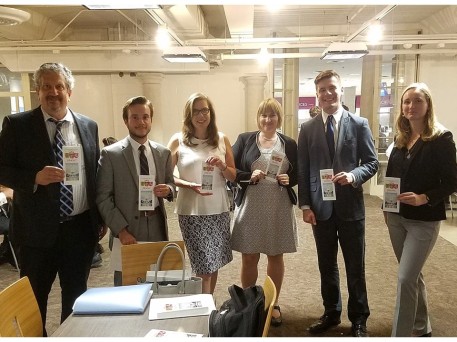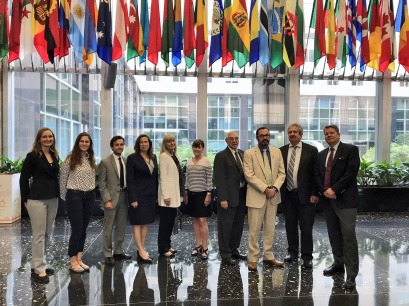The process of getting this summer’s sanctions bill through Congress and passed into law was a real cliffhanger! After passing in the Senate almost unanimously in mid-June, then getting delayed and revised in the House and eventually passing there, also almost unanimously, and going back to the Senate for another vote of overwhelming support, H.R.3364 – the Countering America’s Adversaries Through Sanctions Act – went to the President’s desk on July 28th and was signed into law on August 2nd. Officially the bill also contained new sanctions on Iran and North Korea as well as Russia, but the main focus was clearly the latter. While the bill was in Congress, The Estonian American National Council (EANC), the Joint Baltic American National Committee (JBANC) and our Central and East European Coalition (CEEC) colleagues were tracking its every move, with staffers and volunteers visiting offices in both congressional chambers and encouraging our constituents and supporters through social media and other channels to contact their Members of Congress (MoC) on supporting the bill.

The JBANC team getting ready for a round of meetings with Representatives (photo courtesy of JBANC).
While we can never really know how much influence our work and grassroots efforts had on the passage of this bill, we do believe that complacency is our enemy. The non-profits representing Americans of CEE descent work daily to make sure the issues affecting that part of the world remain a focus in Congress, and your help is always appreciated! In particular, we invite you to contact your MoC to voice your interest in Estonian security and an active and engaged US policy for the region. We in Washington can make the rounds and deliver letters on the Hill all year long, but the biggest impact comes from the MoC’s actual constituents, whose votes matter to those lawmakers we’re visiting. We’d love your help in letting them know that Estonian-Americans support a stable Europe that is a strong US ally, and that Estonia is an important part of this stable Europe.
Now for the how-to part: Several sources in Washington have told us that phone calls to the MoC office are more effective than written correspondence, so we recommend calls over e-mails, letters or social media posts. It’s easy to find the contact information using Google. If there’s a group of Estonians living in the same district, you could coordinate to focus on one issue and make your calls all on the same day. Voicing your issues in person – by visiting your MoC local office or attending town hall meetings – can also get their attention. Best, of course, is visiting or calling the Washington DC office of the MoC, where it is likely that the staff will be most conversant with foreign policy issues. Even if you are hesitant about visiting a Washington Congressional office on your own, consider letting the EANC or JBANC staff know when you are going to be in town, so that you might be able to visit the Congressional office together. The EANC or JBANC staffer can be an invaluable source of background information and ensure that the key message is delivered clearly to the Congressional staffer. At the same time, you, as a constituent, can open doors to Congressional offices that are not as easy for Washington-based EANC or JBANC personnel to access.
Should you decide that a phone call is the better way for you to reach out, your call will generally be answered by a young staffer whose only job may be answering calls from constituents. Depending upon the office, there are sometimes staffers who specialize in certain topics such as foreign policy, so it might be good to begin by asking for the staffer who deals with foreign policy matters. Congressional staffers get a lot of calls daily on many topics and take notes to pass on to the MoC. Many offices keep a database of calls organized by topic, and your call will likely be added to whatever record-keeping system they use. Before you make your call, it’s a good idea to think about what you want to say. While you do not want to sound too scripted, remember that the staffers are busy, and will appreciate your getting to the point fairly quickly. Still, personal stories showing why an issue is important to you are especially memorable and effective; just make sure you’re respectful as you share your thoughts. Remember, it’s their job to listen to you and learn what you think is important. It is fine to express a general sentiment that you value the support of the MoC for issues that help ensure the support of the US for its Estonian ally. But if there is a particular piece of legislation that is being discussed, make sure that you mention your support (or, if necessary, disapproval) of that particular legislation. Then, it certainly helps to know the name or number of the bill in question, before you call.
For ideas on issues to bring up with your MoC, a list of current legislation and other high-priority topics is available at ceecoaltion.us. Details for all of the bills listed are available at the Congress.gov website. If you contact your Representative on a House bill, it’s always a good idea to also ask them to join the House Baltic Caucus, or express thanks if they’re already a member. You can check to see if your Representative is already a member at housebalticcaucus.webs.com.
EANC will continue to support legislation that addresses European security policy pertinent to Estonia and we’ll facilitate efforts by our members and constituents to do the same. Our activities in Washington will continue to ensure that the administration and lawmakers are aware of issues important to Estonian Americans, and we hope you’ll join us in sharing our message!



